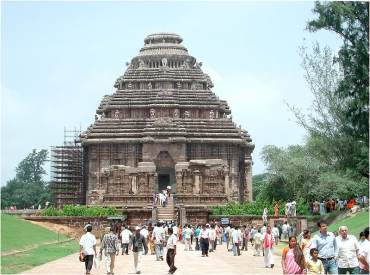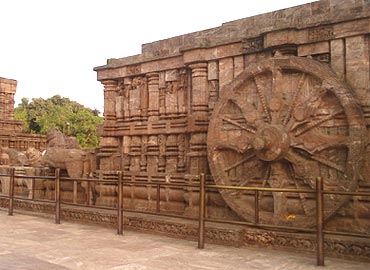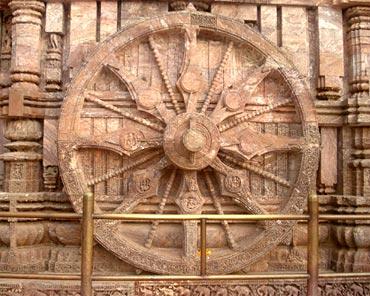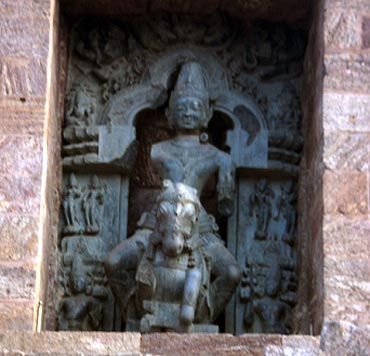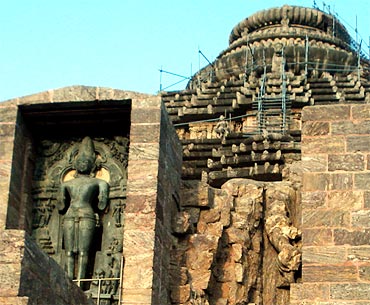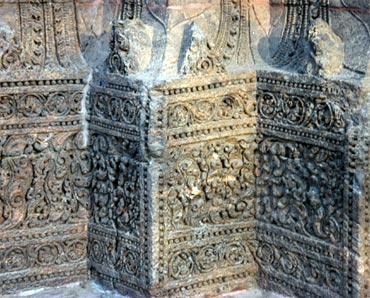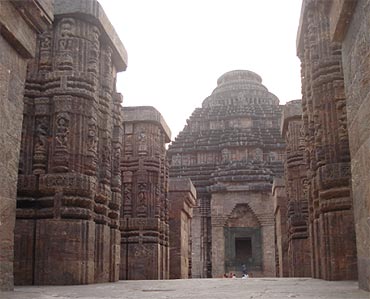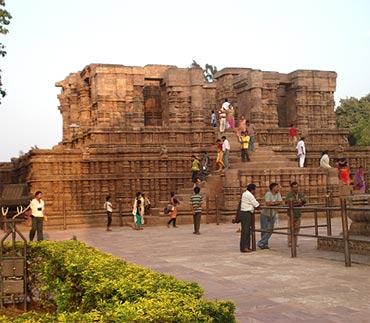 | « Back to article | Print this article |
Konark temple: Standing in solitary splendour
Making one wonder about the engineering prowess of our forefathers is the majestic Sun Temple at Konark built in the thirteenth century.
Though partly in ruins, the Temple is a towering testimony to the Indian medieval architecture.
History has it that the Temple was erected just on the seashore as a gigantic chariot of Surya, the Sun God, to commemorate a military victory by the Ganga dynasty King, Narasimhadeva.
The author works for a pharmaceutical company crisscrossing India's length and breadth that provides her with an extraordinary opportunity to observe India's diversity and beauty and struggles and successes of her people.
Magnificent Seven Ride
The massive structure of the temple, currently being renovated, was designed as a chariot carrying the Sun God across the heavens and has an east west alignment.
Seven magnificent, spirited, life-size horses appear to be drawing the chariot towards dawn.
Kalachakra, the Wheel of Time
Twelve pairs of exquisite, ornate wheels of the chariot, each around ten feet in diameter, are the major attractions of the Temple.
The spokes of the wheels serve as sundials, and the shadows formed by these give the precise time of the day.
Together, the twelve pairs of wheels (representing 12 months of the year) and the seven horses (representing days of the week) drawing the chariot symbolise the passage of time.Sun in all His glory
Images of the mighty Sun are positioned in different directions at Konark capturing the sunrays at different times of the day.
On the northern wall is the Sun God called as Astachala-Surya (setting-sun).
This beautiful image is carved of high-quality green chlorite stone and is one of the masterpieces of Konark. Surya wears tall riding boots, and is accompanied by a small figure of Aruna, the charioteer, at his feet.Konark's presiding deity
A flight of steps from the northwestern corner descends down to the sanctum sanctorum where a black chlorite throne has been constructed. It was on this throne, it is said that the idol of Surya Narayana, the presiding deity of the Konark Sun Temple, was originally enshrined.
The idol of Surya Narayana, however, is no longer there. The access to the inner sanctum is currently barred and sealed off.
Moving on to the west side one can see Midhyanna-Surya (midday-sun), standing with full energy and power.
The image of the sun in south representing Prabhat-Surya (morning sun) and therefore expressing youthful energy is obscured due to the renovation activity.
Scrollwork and carvings
The temple walls are adorned by fine scrollwork.
These intricate carvings as well as the beautiful cut of animal and human figures, make it a must visit destination for the architecturally inclined.
Decay and reinstatement
Over the centuries, the sea receded, the sand engulfed the temple and salty breeze eroded the stones.
The temple remained buried under a huge mound of sand until the early 20th century, when restoration began under the British.
UNESCO declared the temple a World Heritage Site in 1984.
The thought of the majestic temple perched on the seashore with the waves kissing its feet centuries ago, brought back to memory the evergreen melody 'waqt ne kiya kya haseen sitam, hum rahe na hum tum rahe na tum' (roughly translates to The charming guile of time spares nobody; neither you nor I remain the same).
By then it was time to bid adieu and in my heart rose this great hope that slowly but surely the Orissa government would wake up and restore the Temple to its glory.
With a promise of return, I turned back to see the resplendent Sun Temple stand tall in spite of all decay and the shakespearean quote zoomed across my mind: 'age cannot wither her', no, not this majestic beauty!'Getting there
The Nata Mandir in front of the main temple also has intricate carvings. This was used for ritual dance performances, it is said, and its walls are adorned with sculptures of musicians and dancers.
Getting there
64 km from Bhubaneswar and 35 km from Puri, Konark can be reached from Bhubaneswar airport or from Puri railway station.
In December every year, the electrifying Konark Dance Festival showcasing all forms of Indian classical dances is held.
You can visit Konark any time of the year, as it has a favourable climate throughout the 12-month period.
